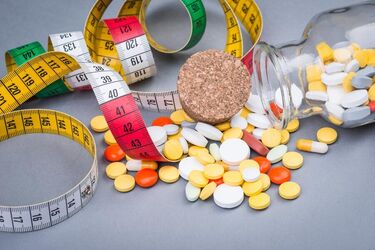Weight loss supplements - money down the drain

We eat a lot, move little, seize stress with sweets and fast food, and then find a gentle way to lose weight as quickly as possible. It's a story as old as time, so manufacturers of weight loss supplements offer us to enjoy our food without guilt, washing down our "little joys" with an encouraging capsule.
However, few people know that regulatory authorities equate dietary supplements with food, not drugs, which makes it difficult to control dietary supplements worldwide. Effective treatment of overweight and obesity is only possible with the help of officially approved drugs and lifestyle adjustments.
However, private clinics and manufacturers of dietary supplements continue to earn fabulous amounts of money on weight loss supplements with questionable, clinically unproven composition. Why is it ineffective and a threat to your wallet?
The dark side of dietary supplements or why you shouldn't believe the advertising?
Private clinics and manufacturers of dietary supplements often offer "natural" weight loss supplements based on so-called "fat burners". Dietary supplements for weight loss usually contain a certain complex of vitamins and minerals, plant extracts, and amino acids, which are presented as "fat burners" in the media, social media, and manufacturers' blogs. Such components are often referred to without clinical evidence:
- green tea and green coffee extracts;
- pineapple and grapefruit extracts;
- caffeine, raspberry ketone, garcinia extract;
- L-carnitine, choline, inositol and L-tryptophan;
- chlorophyll, etc.
It should be noted that there is not a single scientifically proven clinical trial in official medicine that confirms the effectiveness of dietary supplements in the treatment of overweight and obesity.
In the United States and Europe, dietary supplements are equated with food as an additional source of micronutrients. Therefore, they are not subject to the same strict requirements and quality standards as medicines.
Neither the European Medicines Agency (EMA) nor the Food and Drug Administration (FDA) is responsible for the claimed properties and effectiveness of dietary supplements. The only thing that regulatory authorities require from manufacturers is the safety of the composition, which is also extremely difficult to control.
European-style weight loss and other advertising tricks
On the Internet, you can come across hundreds of bright and encouraging ads for diet pills with questionable composition and promising effectiveness. Given the demand for fast weight loss, dietary supplement manufacturers, distributors, and private clinics make quite good money on such supplements.
How justified is this "therapy" for obesity and what do patients actually get instead of money? The Kyiv-based training clinic for cosmetologists and aestheticians, European Aesthetics-Ukraine, offers its patients, as well as anyone who wants to lose weight, to "enjoy their favorite food without guilt" by drinking Lineatabs effervescent diet pills.
According to an advertisement on the company's official website, the key ingredient in Lineatabs is the natural, patented Solusitan complex, which consists of dietary fiber and poly-D-glucosamine.
The manufacturer also states that the patented poly-D-glucosamine complex has a positive magnetic charge, while fat molecules are negatively charged. Positively charged Solusitan attracts fat like a magnet, removing it from the body.
Harmless but deceptive composition
Leaving aside marketing gimmicks that have nothing to do with official medicine, Lineatabs effervescent slimming pills contain glucosamine, inulin, vitamin C, stevia, vitamin B2, sorbitol sweetener, and natural lemon and lime flavors.
It should be noted that glucosamine is a substance that maintains the elasticity and mobility of joints. The compound is found in the body of humans and animals. Researchers note the largest amount of this substance in crustacean shells.
In clinical trials, glucosamine is not associated with weight control and obesity therapy, but studies in mice have shown that the substance reduces insulin resistance.
In another study involving obese women with knee osteoarthritis, the patients followed a diet, engaged in physical activity, and took glucosamine supplements. The researchers concluded that moderate exercise and diet had a more significant therapeutic effect than glucosamine supplementation.
Vitamins C and B12, although not harmful to the body, will not affect weight loss either. Trace elements are not associated with weight control and obesity therapy in clinical trials. Only inulin, which is included in the supplement, proved its effectiveness in reducing visceral fat in several studies. However, it does not affect weight loss.
Official medicine: treatment of overweight and obesity
Zepbound, Wegovy, Ozempis, Mounjaro are a list of innovative drugs for the treatment of obesity, overweight, and type 2 diabetes approved by the FDA. The active ingredients tireseparatide and semaglutide, GLP-1R receptor agonists, affect hormonal receptors, provide weight loss and improve blood sugar. The effectiveness of these drugs has been clinically proven.
Despite side effects and high costs, experts and doctors believe that new weight loss drugs have great potential for obesity treatment in the future. The high price, problems with insurance, and shortages of these drugs on the market are still a deterrent.
In addition to the use of drugs with proven efficacy, modern medicine also offers a balanced diet and physical activity to control weight after therapy. As for dietary supplements with herbal and vitamin composition, they have no clinically proven base, so they cannot be positioned as effective weight loss products.
